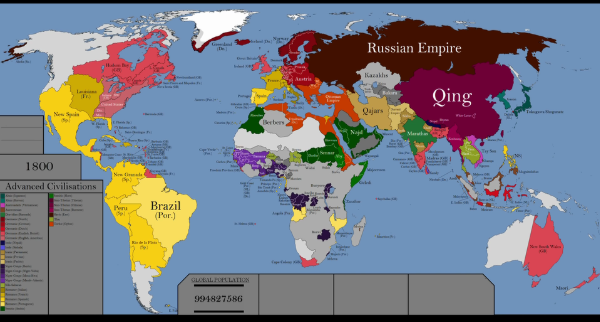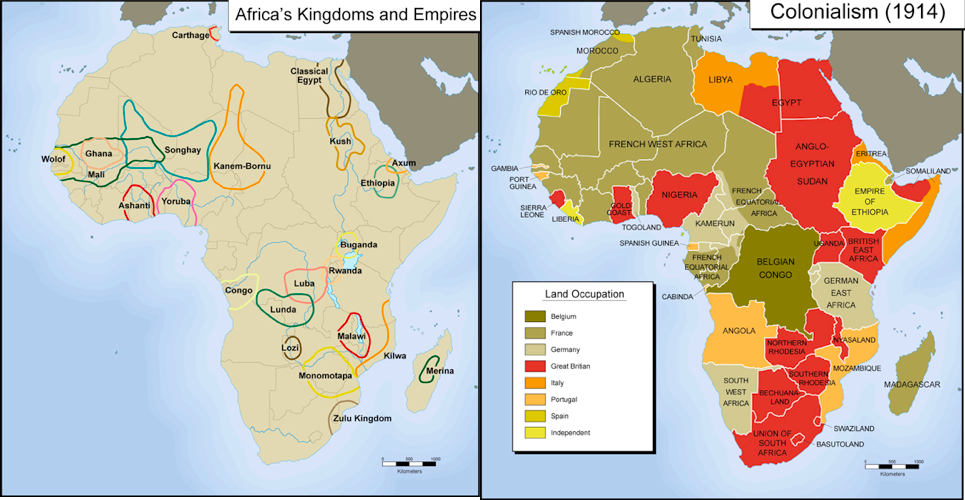Amanda DoAmaral
Riya Patel
AP Human Geography 🚜
320 resourcesSee Units
Political Processes
Political maps have changed over time due to a variety of factors, including shifts in political boundaries, the formation of new countries, and changes in the names or borders of existing countries.
Throughout history, political boundaries have often changed as a result of wars, conquests, and other types of political conflict. For example, the borders of many European countries have changed significantly over the past several centuries as a result of wars and treaties.
Political boundaries have also changed as a result of the formation of new countries. For example, the breakup of the Soviet Union in the 1990s led to the formation of several newly independent countries in Eastern Europe and Central Asia.
In addition to changes in political boundaries, the names and borders of existing countries have also changed over time. For example, the name of the country known as Ceylon changed to Sri Lanka in 1972, and the country of Burma changed its name to Myanmar in 1989.
Overall, the political map has changed dramatically, even in just the last century. But for a real eye opener, take a look at what the political map looked like in 1800.

So how did we go from that to what we have now? Well, it was a messy process as there are forces at play that can unify or break up countries.
The idea that nations could establish an independent country is not all that old. In the 1600s, during the Enlightenment, nationalism was first theorized. Nationalism is a political and social ideology that emphasizes the collective identity and interests of a nation or a people. It involves a belief in the right of a particular nation or group to self-determination, and often involves the promotion of national unity, pride, and culture. This is the spark that leads to an independent nation state. Although too much of it can also be detrimental to a state and can lead to never ending wars, as we saw in the 19th and 20th centuries.
Colonialism & Imperialism
Throughout history, the political map was vastly altered because of imperialism. Imperialism is the practice of a country extending its power and influence over other countries, typically through the use of military force, economic coercion, or cultural domination. It often involves the colonization or annexation of other countries, and the exploitation of their resources and labor for the benefit of the imperial power. This could be politically, culturally, or economically. States are motivated to practice imperialism for two reasons - materials and markets. Imperialism increases access to natural resources and creates new markets to sell goods.
Colonialism is the practice of a country establishing and maintaining colonies in other parts of the world, typically for the purpose of economic exploitation, cultural assimilation, or political control. It involves the settlement of a colony by citizens of the colonizing country, and the imposition of the colonizing country's culture, laws, and governance on the colonized territory. The Europeans began practicing colonialism in the 1500s and expanded rapidly until much of the world was colonized by Europeans.
Spain and Portugal kicked things off in the 1500s by establishing empires in Central and South America for “God, Glory, and Gold.” ("God, Glory, Gold" is a phrase that is often associated with the Age of Exploration, a period in history during which European powers embarked on voyages of discovery and conquest around the world.) England, France, and the Netherlands followed, mostly colonizing different territories in North America. The early Europeans fought each other frequently for more dominance across the Americas straight through the 1800s.
Berlin Conference
In the late 1800s, Germany, Belgium, Italy, and others joined the game, setting their sights on Africa and Asia to catch up with their European competitors. By the end of the 1800s, all of Europe turned to Africa and European leaders met at the Berlin Conference (without any African leaders present) to divide up the continent. They didn’t pay any attention to tribal and traditional boundaries, and instead, completely redrew country borders however they wanted.
Here’s what Africa looked like before and after the Berlin Conference. Notice how afterward, only Ethiopia and Liberia remained independent. Keep in mind that native Africans lived across the continent before Europeans arrived and they had established centuries of flourishing empires, cultures, and societies. European colonization changed all of that.

World Wars
Both World War I and II led to drastic changes in the appearance of the political map.
World War 1
World War 1 was a global conflict that took place from 1914 to 1918. It was sparked by the assassination of Archduke Franz Ferdinand of Austria-Hungary, and quickly escalated into a full-scale war involving many of the major powers of the time.
The main Allied powers in World War 1 were France, Russia, and the United Kingdom, who were joined by the United States in 1917. The main Central powers were Germany, Austria-Hungary, and the Ottoman Empire.
World War 1 was characterized by the use of modern industrial and technological advances, such as machine guns, poison gas, and tanks, which resulted in a high number of casualties. It also saw the first use of aircraft in warfare, and the development of new forms of warfare, such as trench warfare and total war.
The war had a significant impact on global politics, and led to significant changes in the balance of power and the political landscape in Europe and beyond. It also set the stage for the even more devastating World War 2, which took place just two decades later.
After World War I, new states were carved out of the losing belligerents including the Ottoman Empire, Austria-Hungary, and Germany. Rising nationalism also triggered independence in other countries at the same time including Ireland from the United Kingdom and Latvia, Estonia, and Lithuania from Russia.
World War 2
World War 2 was a global conflict that took place from 1939 to 1945. It was sparked by the invasion of Poland by Nazi Germany, and quickly escalated into a full-scale war involving many of the major powers of the world.
The main Allied powers in World War 2 were the United States, the United Kingdom, the Soviet Union, and China, who were joined by many other countries. The main Axis powers were Nazi Germany, Fascist Italy, and Imperial Japan.
World War 2 was a total war, involving the mobilization of entire societies for the war effort. It saw the use of advanced technological and military innovations, such as nuclear weapons, and resulted in a high number of casualties.
The war had a significant impact on global politics, and led to significant changes in the balance of power and the political landscape in Europe and beyond. It also set the stage for the Cold War, a period of political and military tension that lasted for more than four decades.
During World War II, the rapid expansion of the Nazis and Imperial Japan changed the maps of Europe and Asia. As soon as both powers were defeated in 1945, their short lived empires were broken up or occupied by other states. For example, the states of Eastern Europe went from Nazi occupation to Soviet control and remained part of the Soviet Union until 1991.
The Cold War
The Cold War (1945-1991) was a period of political and military tension that lasted from the late 1940s until the early 1990s. It was characterized by a global power struggle between the United States and the Soviet Union, and their respective allies, who were divided by ideological differences and competing interests.
The Cold War was fueled by the emergence of two superpowers after World War II, the United States and the Soviet Union, who were each determined to spread their own ideology and influence around the world. The two sides engaged in a variety of proxy wars, arms races, and other forms of competition, but never directly confronted each other in open warfare.
The Cold War had a significant impact on global politics, and shaped the course of international relations for more than four decades.
The US focused on economic imperialism in Latin America and adopted old colonies as new states including Hawaii and Alaska. Meanwhile, the Soviets were pressing into Asia, which prompted the US to fight back. Proxy Wars were fought in Korea, Vietnam, and Afghanistan as the superpowers fought each other through the peoples of these countries.
Decolonization
The end of World War II also ushered in an era of decolonization. Decolonization is the process of a colony gaining independence and becoming a sovereign nation. It involves the withdrawal of a colonizing power from a colonized territory, and the transfer of political and economic control to the people of the colony.
States under colonization fought for their independence from the moment they were occupied. But the World Wars stalled any independence efforts and the colonized nations were forced to join their colonizers in the fight. This is what made these wars global in the first place. Australians, Indians, Brazilians, and Egyptians found themselves entangled in the web of alliances.
After World War II, the independence movements recommenced almost immediately. The European nations were severely weakened by the war and did not have the resources to retain control over their colonies. Some countries like France fought hard to hang on to colonies, but Vietnam, Indonesia, and Algeria fought back and won their independence.
The British were in ruins after the war and agreed to a peaceful independence for India and Israel. However, both countries were quickly thrown into violent conflict as India was partitioned to also create Pakistan and as Israel was attacked by every surrounding country.
Post-Cold War
In the 1990s, the Soviet Union collapsed, which led to the independence of 15 new countries in a single year. The quick shift of power was actually peaceful because the Soviets were so weakened by the costly war against Afghanistan that they had fought for a decade.
The geopolitical forces of nationalism and imperialism changed the map dramatically in the last two hundred years and both of these forces continue to affect current issues. Within the next century, the map will surely change further as more countries gain independence.
🎥 Watch: AP HUG - Supranationalism
Browse Study Guides By Unit
🗺Unit 1 – Thinking Geographically
👪Unit 2 – Population & Migration
🕌Unit 3 – Cultural Geography
🗳Unit 4 – Political Geography
👨🌾Unit 5 – Agriculture & Rural Land-Use
🌇Unit 6 – Cities & Urban Land-Use
💸Unit 7 – Industrial & Economic Development
🧐Exam Skills
📚Study Tools

Fiveable
Resources
© 2025 Fiveable Inc. All rights reserved.